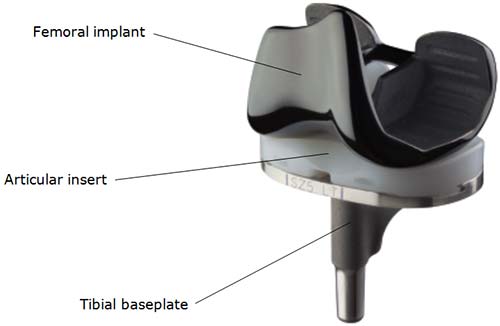Journey Bi-Cruciate Stabilised (BCS) knee replacement system - femoral implant
Consumers and health professionals are advised that Smith & Nephew, in consultation with the TGA, has issued a hazard alert regarding the femoral implant component of the Journey Bi-Cruciate Stabilised (BCS) knee replacement system.
Consumers and health professionals are advised that Smith & Nephew, in consultation with the TGA, has issued a hazard alert regarding the femoral implant component of the Journey Bi-Cruciate Stabilised (BCS) knee replacement system.

The Journey BCS knee system is a primary total knee replacement system. That is this implant system is used when a knee replacement surgery is occurring for the first time.
It has been identified in the Australian Orthopaedic Association’s National Joint Replacement Registry (AOANJRR) that the femoral implant/tibial baseplate combination of the Journey BCS knee replacement system is having a higher than expected revision rate when compared to all other primary total knee replacements.
Based on this information, Smith & Nephew is withdrawing the femoral implant component of the Journey BCS knee replacement system from the Australian market. After this action, Journey BCS will no longer be available in Australia as a primary total knee replacement system.
The TGA's routine processes involve close analysis of the AOANJRR annual reports, together with review of internal incident reports and consideration of external specialist advice.
Information for consumers
Smith & Nephew has contacted surgeons who have implanted the Journey BCS knee replacement system, providing further information regarding the above issue and advice on how to treat affected patients.
If you have had a knee replacement and experience unexpected pain or instability, or if you have any questions or concerns, contact your surgeon or the hospital where the surgery was undertaken.
Information for all health professionals
Patients who have had a knee replacement and who have any questions or concerns about the above issue should be referred to their surgeon or the hospital where the surgery was undertaken.
Information for orthopaedic surgeons
Smith & Nephew has contacted surgeons who have implanted the Journey BCS knee replacement system, providing further information regarding the above issue and advice on how to treat affected patients.
Surgeons are advised to contact their patients who have been implanted with the femoral component of the Journey BCS knee replacement system as a part of a primary total knee replacement and inform them of this issue. You are advised to maintain standard follow-up protocols and actions.
Removal is not recommended. A revision should only be considered if symptoms related to implant failure are identified.
Reasons for revision for the Journey BCS knee replacement system include all of the typical reasons for revision for primary total knee replacements, but the AOANJRR indicated that Journey BCS has a higher incidence of revisions due to:
- patellofemoral pain
- unspecified pain
- instability.
Additional information
The most recent revision data for the Journey BCS knee replacement system published by the AOANJRR include:
- a revision rate of 1.59 (1.34, 1.88) revisions per 100 observed component years compared to 0.72 (0.70, 0.73) for other total knee replacements
- a yearly cumulative percent revision of 7.0% (5.8, 8.4) at 5 years compared to 3.8% (3.7, 3.8) for other total knee replacements.
Reporting problems
Consumers and health professionals are encouraged to report problems with medical devices. Your report will contribute to the TGA's monitoring of these products. For more information see the TGA Incident Reporting and Investigation Scheme (IRIS).
The TGA cannot give advice about an individual's medical condition. You are strongly encouraged to talk with a health professional if you are concerned about a possible adverse event associated with a medical device.

